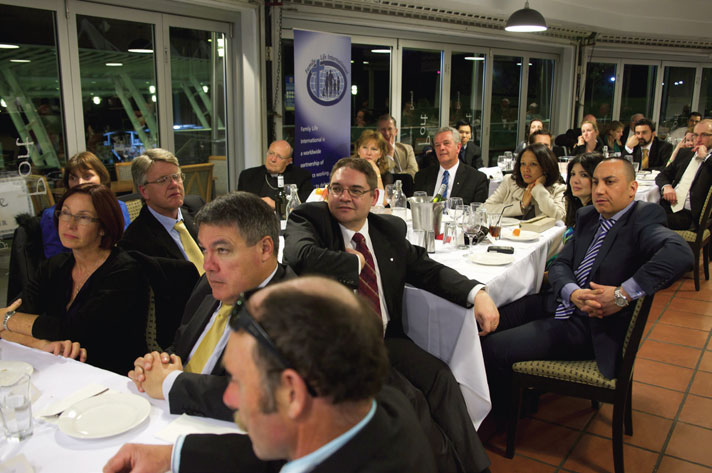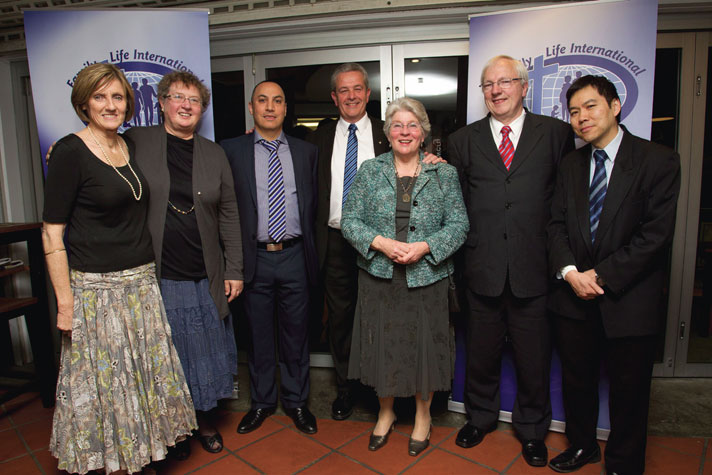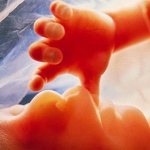To Paul, Chris, Bishop Porteous, friends one and all:
Thank-you for the honour of having me as an Anglican here tonight. I’m here in the spirit of Charles Colson, the recently departed American adviser to President Nixon who went to jail and became profoundly converted and spent the rest of his life in Christian ministry. He joined forces with some wonderful Catholic people in the spirit of what he called co-belligerency – in the face of the incredible diversions and perversions of a ridiculously secular world that now seems to surround us.
I would like to just say a few things about that tonight because, as I was saying to Bishop Porteous, I realised that there is nothing really that I can impart to you in terms of insights, in terms of godly wisdom and in terms of great learning that you don’t have access to already. I mean that very sincerely and I salute you for it. But I think it’s fair to say that, like you, I share a deep sense of concern about where our society is going, what it might all mean, and how we might respond. I would like to say a few things about that tonight, in the hope that it might give you a helicopter view of the world in which we live.
Now, I count myself very fortunate to be an Australian. We enjoy a standard of living, freedoms and opportunity that most people through the ages could only have dreamt of. And yet, are we not part of a dominant Westernised culture that has been on top for so long that we rather lazily and arrogantly assume it will always be so? That our societies will always be great and prosperous places? Although we pride ourselves on our commitment to things like multiculturalism and the defeat of racism and other historical divisions, we’re rather smug about thinking we’re pretty good and that it will go on forever in the way that it has. I don’t think we should assume any such thing anymore!
I don’t think we’ve got much of an idea about where we are, or who we are.
I heard a story about two Seamen with the Royal Australian Navy who found themselves docking in Plymouth, United Kingdom. With two young ladies they wandered off to the pub and got themselves well and truly inebriated. Out on the street at closing time, one of them looked at the other and said “We’re lost. We don’t know where we are. How are we going to get back to the ship?” The other bloke pointed to an Englishman walking across the street and suggested: “This guy might know where we are.” So they pulled up this English officer who had officialdom stamped all over him and asked him for their whereabouts. “Do you know who I am?” the officer asked. The Australian looked over to his friend and commented: “Now we’re in real trouble. We don’t know where we are and he doesn’t know who he is.” And I put it to you that this is where our culture is at.
You would have heard about the GFC – the great financial crisis which goes under various titles in recent times. The blunt reality is that it now threatens the dominance of the West. It is unlikely that Europe will recover. It will certainly never be the major economic force it has been in the past; nor, in my view, will it be a social force. Even Americans, if they are not very careful, will soon have to face the reality that many of them are talking about right now – perhaps their best days are behind them. The figures are actually staggering. Many of you would have heard the stories about Greece. The way in which economists try to describe Greece’s problem is to talk about their debt to GDP ratio. GDP is the total value of all the goods and services produced in an economy in any given year. Greece’s debt has reached 160% of its annual GDP. This is regarded as a very serious problem. Japan’s is worse. Britain’s was worse after the Napoleonic wars. It is a truly crippling figure and it threatens their future.
What you’re not being told is that in addition to the economic catastrophe, there is a far worse crisis looming for Greece. They have made commitments to future generations – what we’re talking about here is monstrous inter-generational theft borne of radical individualism – a nice way to describe the unlimited selfishness of the baby-boomers. They have racked up debts that are not funded, not budgeted for, with pensions and healthcare for the baby-boomers that they expect their children and their grandchildren to pay of 875% of GDP!
The powerhouse of Europe is usually regarded as Germany. Germany only has a debt to GDP ratio of about 95%. However, their ongoing unfunded liabilities that future generations must pay for are in the order of 400%. On current commitments, a young German man starting work at the age of 20, by the time he is 50 years of age, will be paying 77% of his wages in taxes. This will be required to sustain retired parents and grandparents based on the current level of legislated but unfunded commitments going forward.
America, the home of capitalism, the wealthiest society the world has ever seen, has a debt to GDP ratio of around 100%. The U.S. has unfunded liabilities going forward of about 500%. Forty-eight per cent of Americans draw all or part of their income from a government cheque, and in 2022, on current indications, the Federal budget will be completely swamped by interest on their debt and welfare payments, leaving nothing for such important things as education, research, roads, defence, foreign affairs and foreign aid. These are staggering figures. Why do I mention them in the context of the things you at FLI are interested in? It is because these figures represent the most staggering inter-generational theft that you could imagine. They are the product of an “it’s all about me” mentality, and the abandonment of prudence and commitment to others.
A couple of years ago, Queen Elizabeth II paid a visit to the London School of Economics and asked a group of learned economists: “Did not anyone see this coming?” The reality is that people did see this coming but they were not listened to. I wonder whether any of you sometimes feel a little like that.

Two examples from when I was at university come to mind.
1. Russian immigrant to America, Alexander Solzhenitsyn, said that he discovered personal freedom – Christian faith, actually – in a gulag archipelago, in a salt mine. In the most appalling of circumstances, he found freedom when he realised that the dividing line between good and evil lay not between black and white, man and woman, Catholic or Baptist, captor and captive – but somewhere across every human heart. He went to America and said [paraphrasing]: “You are in danger in the West of bringing on yourself voluntarily the sort of oppression and loss of freedom and destruction of soul that the Russians actually have enforced on them by their government!” He was ridiculed.
2. Malcolm Muggeridge, a BBC journalist who spent a lot of time in Russia, was a very tough and insightful person. While visiting America he attended a lecture on the Frenchman, Blaise Pascal, who was a very gifted intellectual Catholic thinker. A lecture series was struck up in the United States in honour of Blaise Pascal. In 1977, Malcolm Muggeridge warned in very crisp language in a series of lectures, titled: “The End of Christendom but not the end of Christianity”: “we are, it seems, determined to eat ourselves out from within.” He referred to the rising indebtedness, the loss of beliefs that drove the loss of values, that drove the loss of behaviour and ethics which had made the West great. He talked about family disintegration and the triumph of moral relativism, whereby those who shout loudest are deemed to adopt a position that becomes truth rather than truth being seen as a function of the facts, research and evidence.
There were warnings everywhere!
More recently, we have had brilliant secular writers like Daniel Altman, an American Harvard graduate who wrote an article in July 2011 called “The United States of Narcissism”. In this article, he said that America now looks like the State of Narcissism and it’s costing big time in economic debt. He’s joined the dots and made the link between the economic decay and the underlying collapse of values that it’s driven. Narcissus was the young man in the Greek legend who stopping to take a drink of water, looked at his own reflection in the pool of water and fell hopelessly in love with that person – himself – to the exclusion of others. This is a Greek tragedy. Loss in self-absorption, self-obsession, selfishness… there is another word for it: s-i-n. He loses his life. It all falls to custard. Altman’s theory is that since the 1960s, in the name of self-discovery and free-love, we have become totally obsessed with self. This, coupled with endless cheap credit, has enabled us to satiate our desires, to go for pleasure, not understanding that it often sacrifices happiness, and to pursue our own interests regardless of the impact on others, having, as Peter Hitchins (brother of famous atheist Christopher Hitchins) put it, decided to mock and ridicule God out of the public square. We destroy His voice, destroy His authority and then move on to destroy the institutions.

He has given us for the good ordering of our society. Marriage is perhaps at the top of that list.
Many Western intellectuals at the time of 9/11, people like Christopher and Richard Dawkins, said that religion is a problem, but very quickly realised that when you say religion is a problem, it’s a bit dangerous to attack other religions, so just went for Christianity. So, Mr Dawkins wants to burn down what little is left of the house of Western civilisation based on the Christianity that we have left. He has no alternative shelter for us to go to at all and even admits that! He says that he does not know where Europe will go post-Christianity (as much as he wants to get rid of it). He says that the decline of Christianity in the UK is happening so quickly that it is frightening because they have not yet developed an alternative! Well, guess what Richard…your atheist mates have been trying to come up with one for years and they still haven’t managed. Have a look at Communism. That was a great success, wasn’t it? Have a look at Fascism. They were European attempts to do it better without God.
Peter Hitchins lived in atheist Russia and wrote the book: “The Rage against God: How Atheism led me to Faith”. He makes the point that having ridiculed God out of the public square, obliterated Him, we then decide to trash the great institutions like marriage and very perceptively he says that for the wealthy and the elite to lead these charges is not so bad. If you’re wealthy enough to do it, you throw your wife away for a trophy wife, or buy a new yacht or Bentley. But when you get down to the ordinary people, for example in the little village like the one I used to represent with 12 children who between them have 3 mothers and 5 fathers – none of the parents cohabiting, that’s pretty devastating. They will be looking to their country to support them. They are not likely to be able to ask what they can do for their country. The trashing of family results in the greatest poverty and social dislocation and trauma to the children of less well-off families, something which seems to escape the notice and the conscience of the progressives who have so derided marriage for so long.
Daniel Altman sees the problem of selfishness destroying the West and recognises that this is a cultural problem, not so much of government regulation or the failure of economics, or that the Communists/Fascists have won, or that the Japanese have won. We have done this to ourselves. He hopes that tomorrow’s families can do a better job of raising their children but he comes from America where 40% of the children don’t have a father or a mother and where 70% of the black children don’t have a father present. How then are the families going to do it?
This is about a profound breakdown of the beliefs that drove the values that drove the behaviour that drove the ethics of the West. Should we give up and despair? No! For Christ’s sake, we cannot. For our brothers and sisters, we cannot.
I love history. Think back to the time Australia was settled in 1788. The American secular historian, Adam Hochschild, notes that at that time, three quarters of the world’s population lived as slaves if you count the caste system in India. Slaves were not seen as humans. They were goods and chattels as proven when they were finally freed. Massive compensation was paid, not to the slaves, but to those people who lost their goods and chattels in 1833 in England. England was the superpower and dominant culture of the day. It was an unbelievably immoral, nasty, unpleasant and cruel place. It wasn’t just because they kept slaves. The Royal family – apart from the King, who was an honourable man – behaved disgracefully, as did the aristocrats. They set the worst possible examples of debauchery, perversion, prolificacy. A quarter of the unmarried women in London were prostitutes and there were live sex shows on every other street corner. It was a truly appalling society.
What happened? A group of unbelievably faithful people who ultimately became known as the Clapham sect resolved to make England a different place, headed up by William Wilberforce who became converted to the Christian faith despite his rich merchant background. He had everything to lose; he became a social pariah, lost all his money, teamed up with Quakers and all people of Christian belief. They met, studied and researched together, got their facts, mounted the arguments, they built relationships, worked with their members of Parliament and they never gave up. Their efforts went on and on. They were defeated in Parliament so many times but gradually, they built a consensus across the land with the help of the internet of the day – the Quakers who owned and operated the printing presses. They could get word across Britain in a staggering day and a half, which at that time was extraordinary. They never gave up. It would be remiss of me not to mention that they first saw to it that they knew and understood the Holy Scripture. They prayed and worked together. They did not attack so much as work with people to get them to understand the legitimacy of their perspective and the great truths they were seeking to unfold.
When Wilberforce got up in Parliament to condemn slavery, he did not attack the slave owners in Parliament. He talked about how we (himself included) in society have been party to this great wrong. This was very humble and avoided pride and self-righteousness. Their work resulted in the freeing of the slaves. Now, we know that there are still slaves today, an estimated 40 million people, but that is not three quarters of the world’s population – nothing like it. Today, historians would tell you that we have a thing called social conscience because of their works. They were active on many fronts; cleaning up corruption in English politics, reforming the way people behaved in schools and much more.
It is a remarkable story of the transforming of a society through the transformation of individuals working together and we should draw great encouragement from it.
I’m not saying that we can assume that this is going to happen again. I am saying that we need to work for it, for Christ’s sake, and this is the charge before us. I believe in this very deeply on a whole range of fronts. If there is one thing I have learnt in politics, it is that you cannot change a man or woman’s heart. This is the work of the Holy Spirit. If you read the Bible, and what it tells us we ought to be, you recognise that none of us are capable of loving God with all our mind, heart and soul. The mind is one to focus on. We are called to engage our mind. None of us are capable of loving our neighbour in this way. It is only in Christ that we can find the freedom and the empowerment to do so. It is important to believe this. We should never give up because God has not given up on us. He hasn’t given up on me, which is amazing and he hasn’t given up on you, which is marginally less amazing and we shouldn’t give up on our neighbours either.
Now many out there would say that my words are arrogant. They say this, I think, because they fail to understand and comprehend that in the end we will all be called to account. Amazingly, a great majority of Australians still believe in God, despite the onslaught of the atheists and the new atheism. Amazingly, 43% still believe in a Resurrected Christ. Detailed research reveals that at heart, deep down, we still know that we will be called to account. So, it’s not our pride, it’s rather our humble love for others that seeks to persuade, at every opportunity and in every way, that there is a better way, a right way. There is truth.
The elephant in the room, if I may conclude with this note, is indeed Jesus Christ. You see, I was once a politician and I recognise politicians and what they do. There was one called Pontius Pilate and he wasn’t a very good one. He knew what was right but wasn’t able to act on it. He had an innocent Man standing before him and he made the wrong choice. He gave way before popular opinion, didn’t he? But when he asked that Person why He came, Christ said: “I came to testify to the truth.” He said earlier in the Gospel of John as it is recorded, that He Himself is the Way, the Truth and the Life. Truth is a Person. We live in an age which says you can’t know truth. Pilate also lived in an age like this; his response was: “Truth. What is truth?” You can almost hear him spitting it out like a good secular Aussie. He was a politician. I recognise him.
We need to make certain that we really do believe that we’re acting in truth and I encourage you to do that. Thank you very much for having me tonight. I wish you well. Thank you for the privilege of being with you all for a few short hours this evening.








